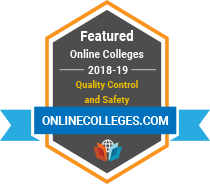Featured Online Colleges for Quality Control and Safety in 2018-19
When enrolling in a school, it is important to choose a college that suits your educational and financial needs. To help with your decision, we've put together this list of five featured online colleges offering online programs in quality control and safety. Data for this list came from the National Center for Education Statistics' Integrated Postsecondary Education Data System (IPEDS), which we analyzed using our proprietary methodology. Check out these schools as you decide which program is right for you.
